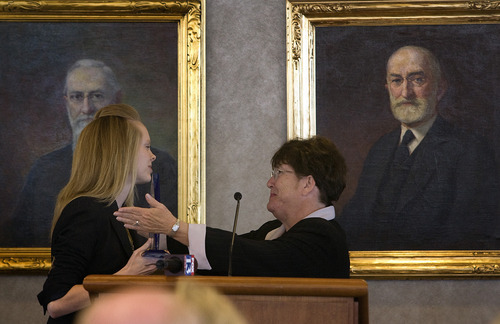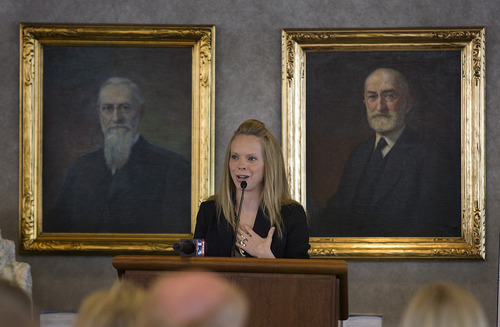This is an archived article that was published on sltrib.com in 2012, and information in the article may be outdated. It is provided only for personal research purposes and may not be reprinted.
For the girls of the 5 Browns, life in the public eye could not shine light on the abuse they kept secret — even from each other — until they found security in their own adult lives, one of the renowned musical sisters said.
"We didn't discuss it, even with each other," Deondra Brown said of the childhood sexual abuse she and her two sisters suffered at the hands of their father and manager, Keith Brown. "We shared everything — but that."
Deondra, the second-oldest of the Juilliard-trained 5 Browns family piano quintet from Alpine, received the Champion Against Child Abuse award Thursday from the Family Support Center in Salt Lake City. She and her sister Desirae were honored for launching the nonprofit Foundation for Survivors of Abuse.
Deondra, now 32, and her two sisters reported the abuse to Lone Peak investigators in 2010 — more than a decade after it occurred, but only three years after the women confided in each other that they had been abused.
"As a child, especially if abuse happens in the home, you have to wait until you are removed from that environment long enough," Deondra said.
Police documents alleged Keith Brown committed hundreds of acts of sexual abuse against the three girls in the 1990s. At the time Deondra was being molested, her trust in her parents trumped her instinct that her father's behavior was wrong.
"You get the feeling something is off, but you shove it away. You don't think about it," she said. "You put such faith in the adults close to you."
She said she can't remember the conversation in which she discovered their father's abuse had extended to all three girls, but it didn't come out until all three girls were stable adults in supportive marriages.
The siblings confronted their father.
"We first tried to resolve it privately," Deondra said. "But the recognition on his part wasn't there."
Not long after that, they learned their father was looking to manage other young female clients.
"We saw that other people were going to be at risk," Deondra said. Were anything to happen to them, she said, "I would not be able to live with myself."
The siblings met with detectives and prosecutors — including some who had worked with Elizabeth Smart in the case against her abductor, Brian David Mitchell. Utah had removed its statutes of limitation for child sex abuse cases, allowing the Browns' case to go forward. Keith Brown pleaded guilty to first-degree felony sodomy on a child and two second-degree felony counts sexual abuse of a child. He was sentenced to 10 years to life in prison.
Now the Browns have picked up the standard for similar laws in states that give child victims a much smaller window to seek charges after they become adults.
"The laws don't protect people the way they should," Deondra said. "We're able to show the plus-side of what happens when these things are changed."
One of the biggest reasons for delay in child-sex cases: "You don't know how people are going to react," she said. "I had to believe I had strength in myself, even if people fall away from me."
Most children aren't independent enough to make that choice, she said. In the Browns' case, the family was not entirely in agreement with the girls' decision to come forward. Deondra would not discuss her mother's role in the case except to say, "We stuck close to the people that we could count on."
"We were very blessed to have the support we needed to get through it," she said, especially from her brothers- and sisters-in-law.
Now the siblings are finding their own roles in the extended family.
"Where we each feel we need to go from here — that's a personal decision," she said. "If someone wants to have contact with my parents, we're supportive of them."







